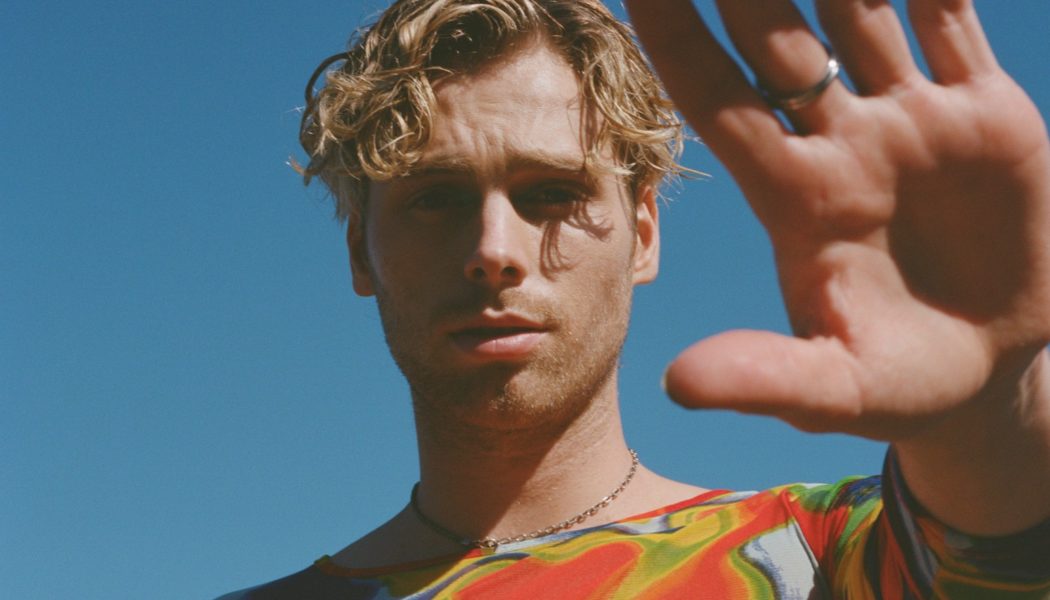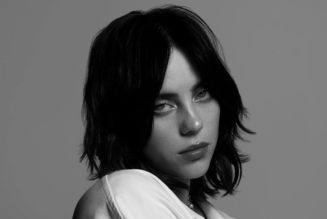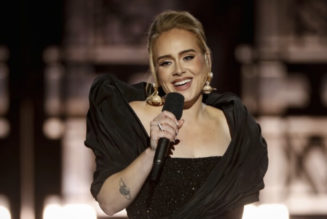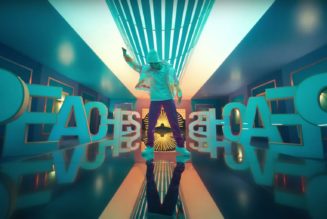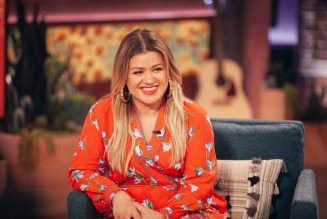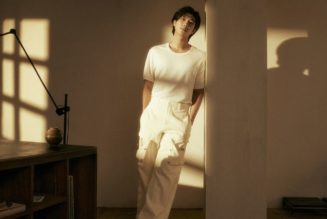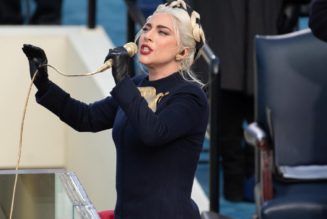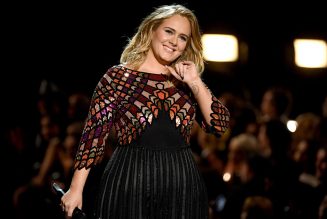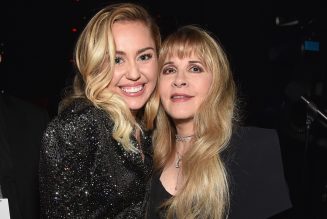
Adopting songwriting into his daily routine, Hemmings untangled his thoughts and repurposed them as When Facing The Things We Turn Away From, his debut solo album out Friday (Aug. 13). Used to sharing the songwriting stage with three other people, the album offered Hemmings an opportunity to craft a musical identity outside of 5SOS through a fully introspective project with his own influences. It also put all of the surrounding pressures on him, even if the scrutiny was coming from his own self.
Ahead of the release of When Facing The Things We Turn Away From, Hemmings answered Billboard’s 20 questions about his relationship with songwriting, overcoming self-imposed pressures and creating an ethereal, over-emotional album as a bookmark in this chapter of his life.
1. What’s the first piece of music that you bought and what was the format?
I bought a CD of Good Charlotte’s The Young and the Hopeless, I believe.
2. How did your parents shape your music taste?
I grew up with a lot of Australian rock music. My dad loves AC/DC and INXS was a big one. My mom was more on the softer musical end of the spectrum, so Crowded House and stuff like that. Definitely all of my rock influences are very Australian typical. I listened to so much Pink Floyd the last couple of years, especially [during lockdown], and was very influenced by them, particularly Dark Side of the Moon. I remember when I was a kid, I [asked my dad], “Did you listen to Pink Floyd as a kid?” and he was like, “Oh no, they’re too psychedelic.” I think it’s so funny because this album is super influenced by them but he was never into them.
3. What was the first concert that you saw that made you want to be on stage, too?
We didn’t get that many shows in Sydney. I saw AC/DC with my dad and I also saw Good Charlotte –– you know, pop-punk will never die. It sounds so lame, but Good Charlotte was the first band I came across as a kid where I was like, “Oh, there’s people with guitars on stage, I could give that a go.”
4. How did moving away from home as a teenager shape who you are?
When you start a band like we did — we started with pretty pop-punk roots –– the whole plan is to get out of the whole town and to make something of yourself. I think as I’ve gotten older, especially since I haven’t seen my family in a long time now, I think I appreciate them more and more. I was very lucky to be a part of going to so many different countries and cities and seeing so many different cultures and people, living that lifestyle at such a young age. I feel like it’s becoming more of a cliche thing now, but I can just encourage anyone who has the means to do any sort of travel. It made me much more compassionate and [informed] about other people’s cultures. Everything is so different everywhere, but everyone is kind of the same in such a weird, balanced way.
5. What’s at the top of your professional bucket list?
I mean, I’d take anything right now. I’d play a show. I’d want to play the Sydney Opera House.
6. Which albums or artists do you find yourself unexpectedly revisiting?
It’s not even a guilty pleasure, but I definitely listen to a lot of Bee Gees. I think they’re rad.
7. What was the last song you listened to, and what’s a song that always makes you cry?
Is it bad if I say myself? I was listening to a demo from this album, “A Beautiful Dream.” One that always makes me cry is “Pain” by The War on Drugs.
8. Which artists, dead or alive, would you love to see live?
I want to see The War on Drugs. Wait, I can use dead, can’t I? Maybe David Bowie.
9. What do you miss most about performing in front of an audience?
I am just dying to play shows again now. Everything. I’d love to be in a standing floor place right now just playing a gig. The feeling of it, I know more than ever I won’t ever take it for granted or not understand the place that it holds in my life, how much I need it and how much I love it. Not that I ever did, but I definitely even more so won’t.
10. How did the pandemic change your creative process?
I wouldn’t have made this album without it. The whole album is literally called When Facing The Things You Turn Away From –– it made me look back at a lot of stuff that I hadn’t dealt with. It changed my songwriting style slightly to somewhat become more of a daily [practice.] It always was, but that was kind of all I did for a long time at home.
There was no moving around. There were no shows. The band wasn’t doing anything for a lot of it. It was literally just me writing songs. I think it changed my songwriting style to letting it happen and stuff coming out of me when it’s supposed to come out and then trying to figure out what it means subconsciously and understand or catch up with it, as opposed to trying to force a song or whatever.
11. When did When Facing The Things We Turn Away From go from a collection of songs to a fully realized album?
I don’t know when it was an album, because I was apprehensive and tinkering up until the final hour. It was gonna be exactly how I wrote it in my head. I knew I wanted to do a body of work when I had a couple of songs like “Mum” and “Saigon” and “Comedown” and “Place In Me.” Songs like that –– even “Starting Line” –– are exactly the type of emotion I wanted to provoke for myself and for other people to listen to. I was tinkering until the end, so it’s difficult to say when exactly it was an album. But there was a moment when I was like, yeah, this is a different thing to what I’ve been doing.
12. What were you setting out to create?
The main thing I wanted to get across, lyrically, I had a lot to uncover and a lot to figure out within myself and portray that in a thought-provoking way. I basically wanted to evoke the emotion that I was feeling at the time through music and through lyric.
Some of the artists that do it great are Bon Iver and Pink Floyd. They evoke such an emotion in me. They resonate on such a deep level. I really want to get that across. Apart from the songwriting itself, I want to say certain things even just for cathartic reasons to understand myself more and understand what happened and where I’m going. I really wanted it to be paired with this tangible, emotional feeling.
13. How has your relationship with songwriting changed over the course of your career?
Right at the very beginning [of 5SOS], I started writing a few songs at home, but Calum, when we were in school, was the one that could create full songs and full bodies of work which I always thought was so cool. I was always getting it almost to the finish line –– this is back when I was 14 or 15 –– and then not being confident enough or not having the skill set. He just seemed to have this thing. Honestly, he was the first in-person inspiration that inspired songwriting for me.
Then, as we moved forward, we were writing songs more as a band. We did a crash course in songwriting when we lived in England and [were] writing a lot in proper songwriting sessions. It was quick-paced and very fun, for lack of a better word, and through the albums it changed. I really, really want to be a great pop songwriter. We as a band work really hard working with a lot of different people, a lot of Swedish people and people like Andrew Watt and Rami Yacoub, trying to understand pop music and what it takes to make pop music.
A lot of those skills are sort of like second nature. Then, on this album, they’re always there as thoughts in my understanding of how to make a song and I’ve been writing for so long, but this one was very much exploring. There were no preconceived notions. Even at the start, it wasn’t like, “I’m going to do a solo album, let’s write the songs.” I just wrote for fun. Let’s see what happens, and then it snowballs into this huge thing. I just wanted to write full songs of my own at the beginning of this. It’s become more of a part of my daily routine now. It’s my favorite thing to do, and also the most frustrating thing in the world.
14. How do you think about the passing of time and how has your perception of it changed?
I have a fear of time that’s a slight fascination with things that are out of your control. For me, the last 10 years of my life felt like 30 years, but also felt like it went by in the blink of an eye. Actually stopping and getting to take stock of that was terrifying. You live one way for so long and it’s such a beautiful, incredible, up-and-down, chaotic thing. Now, it’s just still and you’re trying to figure that out. There is a fear of that. It’s terrifying, we’re all gonna get old and we’re all gonna die. That’s so dark, but it’s so true and I think that humanizes us.
I was 24 when I made the album, and I felt like I’d done so much but also not done enough. Having that time at home and making this album, I got to figure all of that out and sort of slow down and think about what makes me happy and what I want to do.
15. How would you describe the feeling of sharing your own story with your audience without the shield of your bandmates?
That fell into every aspect of it, even doing this. It’s my name behind this interview, it’s not the band. It’s a scary thing –– doing videos on my own, doing photoshoots –– they’re all part of a thing that is very much outside of the safe space that I am used to. I think I put myself under a lot of pressure, anyway, so me taking on this and it being just me has put more pressure and more scrutiny. On a personal level, it almost felt like I needed to make this. I needed to say these things and I needed it to feel like this and be packaged in a way that had this hyper-emotional feeling to it.
When I was writing this, I wasn’t thinking, “Oh no, what are people going to think of this lyric?” Up until it was released, I didn’t really think about it like that. It’s all quite nerve-wracking to put out songs after doing it a different way for so long, but lyrically, there was no fear about saying too much.
16. How did you want listeners to approach the album knowing that it wasn’t created with the intention of being performed for a live audience?
With the band, when we make albums we think about the live space pretty heavily. With this, there’s no thought of that. I’m not going to play any shows for the foreseeable future. I don’t know if it fully played into the writing style. At the time, there was no big management company, there was no label, there’s no live shows. “Is this even gonna come out? Am I gonna be able to make a full album?” Everything else besides writing the songs, including the live aspect, was not thought about. It was very much, how do I make these songs sound the best on the album, and how do I get across exactly what I want to say exactly the way I want to say it and have those two worlds meet each other? There was no infrastructure at all, just me and [producer Sammy Witte] and Sierra making an album and just making music.
17. What’s one thing that even devoted fans are going to learn about your musical influences that they wouldn’t hear in your work with 5SOS?
They’ll definitely pick up that I like the big, grandiose, ethereal vibe. The whole album is very Pink Floyd, M83, Arcade Fire, The War on Drugs –– big, ethereal, Bon Iver-type feelings that are juxtaposed with very much classic songwriting. I love Neil Young and Bob Dylan, all of these people who have very classic songwriting. That is the balance I was trying to strike of introspective and personal lyrics, but sometimes taking it very grandiose.
18. How do you approach your creative process when you don’t have any time constraints?
It’s not even like we as a band compromise a crazy amount, anyway. We make whatever we want and we make s–t we love. I love making music with the band, but there’s no getting around that the band has made four albums. There’s already something that’s been said before. For this, it’s starting again at square one. I had what felt like all the time in the world to figure out what I wanted to make. There was no first album before this, there’s no label deadline, no one waiting on it. It felt really good, to be honest. The only person that could figure out when it was done was me which was really hard, because usually, I have the rest of the band. It was freeing.
19. What’s one piece of advice you would give to your younger self?
Maybe don’t wear the same pair of Vans, because there’s lots of eyes on you. Switch up the shoes and wear some socks.
20. When you look back on When Facing The Things We Turn Away From in the future, what do you hope for it to encapsulate for you?
When I understood that this would be a seperate project, I knew it was going to be really difficult to get it over the line because of the kind of person I am and the kind of pressure I put myself under for no reason. It was really hard, and really challenging. I think on a personal level when I look back, whether a couple of people like it or it does whatever, it doesn’t really matter. I got it over the line and I finished it. I’ll always be proud of that.
For other people listening, I hope it’s a crazy, beautiful, overemotional world to get lost in in a body of work, because that’s what it was intended to be: a bookmark of how I felt at that time.

